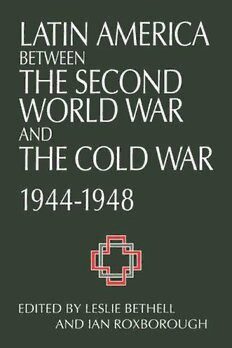
Latin America between the Second World War and the Cold War: Crisis and Containment, 1944–1948 PDF
363 Pages·1997·4.344 MB·English
Most books are stored in the elastic cloud where traffic is expensive. For this reason, we have a limit on daily download.
Preview Latin America between the Second World War and the Cold War: Crisis and Containment, 1944–1948
Description:
This volume aims to establish that the period between World War II and the beginning of the Cold War (1944-5 to 1947-8) represents an important conjuncture in the political and social history of Latin America in the twentieth century. The volume contains an Introduction and a Conclusion by the editors and case studies of eleven of the twenty Latin American republics. Despite differences of political regime and different levels of economic and social development there are striking similarities in the experiences of the majority of the Latin American republics in this period. For most of Latin America it can be divided into two phases. The first, coinciding with the Allied victory in the Second World War, was characterized by three distinct but interrelated phenomena: democratization; a shift to the Left, both Communist and non-Communist; and unprecedented labor militancy. In the second phase, coinciding with the onset of the Cold War and completed almost everywhere by 1948, labor was disciplined by the State and in many cases excluded from politics; communist parties suffered proscription and severe repression; reformist, "progressive" parties moved to the right; the democratic advance was for the most part contained, and in some cases reversed.
See more
The list of books you might like
Most books are stored in the elastic cloud where traffic is expensive. For this reason, we have a limit on daily download.
